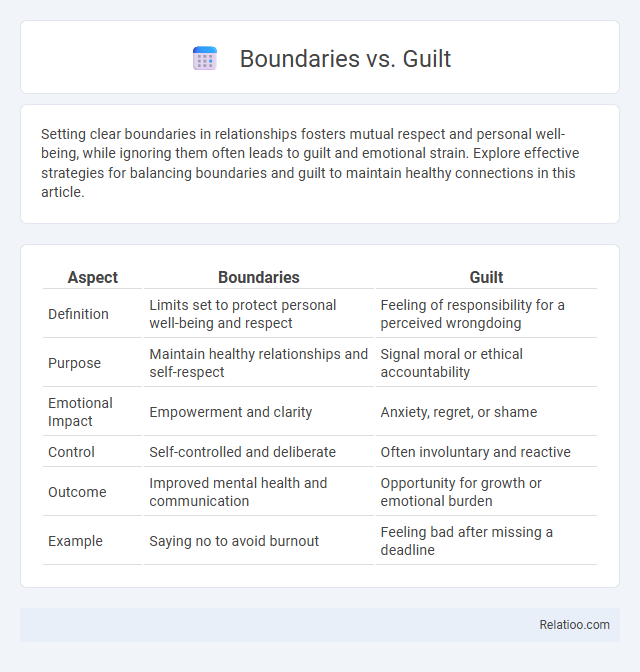Setting clear boundaries in relationships fosters mutual respect and personal well-being, while ignoring them often leads to guilt and emotional strain. Explore effective strategies for balancing boundaries and guilt to maintain healthy connections in this article.
Table of Comparison
| Aspect | Boundaries | Guilt |
|---|---|---|
| Definition | Limits set to protect personal well-being and respect | Feeling of responsibility for a perceived wrongdoing |
| Purpose | Maintain healthy relationships and self-respect | Signal moral or ethical accountability |
| Emotional Impact | Empowerment and clarity | Anxiety, regret, or shame |
| Control | Self-controlled and deliberate | Often involuntary and reactive |
| Outcome | Improved mental health and communication | Opportunity for growth or emotional burden |
| Example | Saying no to avoid burnout | Feeling bad after missing a deadline |
Understanding Boundaries: Why They Matter
Understanding boundaries is essential for maintaining healthy relationships and preserving personal well-being. Clear boundaries help distinguish individual responsibilities, reducing feelings of guilt and preventing the overextension created by obligation. Establishing and respecting boundaries fosters mutual respect and emotional balance, crucial for both personal and professional interactions.
The Nature of Guilt: Emotional Roots
Guilt originates from deeply ingrained emotional responses tied to personal values and social expectations, often acting as an internal regulator of behavior. It reflects an awareness of having violated a moral or ethical boundary, triggering feelings of remorse and responsibility. Understanding the emotional roots of guilt is crucial for distinguishing between healthy boundary-setting and obligation-driven actions that may lead to unnecessary self-blame.
Setting Boundaries Without Feeling Selfish
Setting boundaries without feeling selfish involves recognizing that personal limits protect mental health and foster healthy relationships. Clear communication of needs and respecting others' rights create mutual understanding, reducing guilt associated with saying no. Emphasizing self-care as a priority helps reframe boundaries from selfish acts to necessary steps for emotional well-being.
Common Myths About Boundaries and Guilt
Common myths about boundaries and guilt include the belief that setting boundaries is selfish or will inevitably hurt others, and that guilt is always a justified response when asserting personal limits. Many people confuse guilt with responsibility, assuming that feeling guilty means they have done something wrong, rather than recognizing guilt as an emotional signal that can be managed through clearer boundaries. Establishing boundaries promotes healthier relationships by reducing feelings of obligation rooted in guilt, challenging the misconception that obligation must be prioritized over personal well-being.
Signs Your Guilt is Sabotaging Your Limits
Your guilt may sabotage boundaries when you feel responsible for others' emotions at the expense of your own well-being. Signs include repeatedly saying yes despite discomfort, over-apologizing for enforcing limits, and second-guessing your decisions to maintain relationships. Recognizing these patterns helps you reclaim control and prioritize your mental health.
Strategies for Healthy Boundary Setting
Establishing clear boundaries involves recognizing your limits and communicating them assertively to prevent feelings of guilt and obligation from taking over. Strategies such as practicing self-awareness, using "I" statements, and setting consistent consequences help reinforce your personal space without damaging relationships. Prioritize your well-being by balancing empathy with firmness, ensuring your needs are respected while maintaining healthy connections.
Communicating Your Boundaries Effectively
Communicating your boundaries effectively requires clear, assertive language that identifies specific limits without ambiguity, ensuring that others understand your needs and expectations. Using "I" statements reduces defensiveness and focuses on personal feelings and responsibilities, preventing feelings of guilt from compromising your boundaries or fostering unnecessary obligation. Establishing consistent verbal and non-verbal cues reinforces these boundaries, promoting healthier relationships and emotional well-being.
Overcoming Guilt Through Self-Compassion
Overcoming guilt involves recognizing the importance of setting healthy boundaries without feeling responsible for others' reactions or emotions. Practicing self-compassion allows individuals to forgive themselves for perceived shortcomings and reduces the internal pressure created by unrealistic obligations. Embracing self-compassion enhances emotional resilience, enabling a balanced approach to boundaries and guilt management.
Real-Life Examples: Boundaries vs Guilt
Setting clear boundaries at work, like declining extra projects beyond your capacity, helps prevent burnout and reduces feelings of guilt for not overcommitting. In family dynamics, saying no to unreasonable requests respects personal limits while avoiding guilt induced by overextending oneself. Recognizing the difference between healthy boundaries and guilt-driven compliance empowers individuals to maintain self-respect and emotional well-being.
Building Lasting Confidence in Your Boundaries
Building lasting confidence in your boundaries requires recognizing the difference between guilt and genuine obligation; guilt often stems from internalized pressures or fear of disappointing others, while obligation aligns with your core values and responsibilities. Clear, consistent boundaries foster self-respect and empower you to prioritize your well-being without feeling undue guilt. Strengthening these boundaries over time enhances emotional resilience and promotes healthier, more balanced relationships.

Infographic: Boundaries vs Guilt
 relatioo.com
relatioo.com